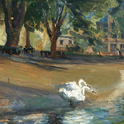My, how classical music can be fun if you really try to, like, involve the audience and make them feel, well, really involved. At the press jamboree in April to announce the Proms season that has just finished, much was made of the fact that almost the whole of the last three weeks of the festival would be broadcast live on BBC4, giving unprecedented visual access to those unwilling or unable to make the daily journey to South Kensington to attend the concerts in person. Given BBC television's general attitude to classical music, this indeed seemed something of a coup—but what one forgot was that what BBC4 was getting was not just three weeks of evening concerts, but a whole way of, yes, really involving us, the people, in the great flagship event that is the BBC Proms. So rather than just watch performers being interviewed during the interval, we could email or text in our own questions that could then be put live to the international musician currently on the screen in own living room. ("And Bernice from Chingford wants to know, maestro, what do you think about while you're conducting, and who's your favourite composer?") There was a sudoku quiz ("How many instruments play in a quintet?") with prizes, and we were asked to produce and send in paintings expressing our reactions to music that had been played. The unfortunate presenter would then have to hold up some monstrosity for the camera and report how Derek from Humberside had tried to represent the spirit of Mozart by setting some great orange splodge against a threatening purple background.
When forced to do this kind of thing, the main presenters, usually Petroc Trelawney or Charles Hazlewood, managed to stay on the right side of embarrassing, which is a lot more than can be said for their colleagues roving around the Albert Hall during the interval. I looked up Myleene Klass on the internet and discovered that she used to be a member of a manufactured pop group called Hear'Say before releasing her first "solo classical album," Moving On. This, to judge from her website's trailer, contains obscenely butchered and popped-up renderings of favourite classical pieces, and duly shot to second place in the classical charts. To have a pretty girl whose respect for the great traditions of western music makes Liberace seem like Alfred Brendel was obviously irresistible to the BBC. Who better to interview that most refined and fastidious of pianists, Lars Vogt, after an extraordinarily subtle and powerful performance of Mozart's D minor concerto? "We absolutely enjoyed it," she reassured him. "You've got a lot of fans, and we've got an email here." She told the wry and scholarly Philippe Herreweghe that he was "very well known for his period performances," before asking whether his early training in psychiatry helped him to get better performances out of his players. When the bewildered Herreweghe charitably sidestepped this—his orchestra is French, not mad—and began to talk about how it might help to understand Schumann, Klass glazed over and he was quickly shut down. There will be a special corner of hell where Klass's chat with The Apprentice's Saira Khan about the unique selling points of classical music will be played in a continuous loop.
Can there really be people who will be turned on to classical music by this sort of thing or by inane chats with well-known people who have been spotted in the audience? (John Bird, we discovered, took up the piano when he was 50 and got to grade seven, while Joanna Trollope likes to create narratives from music.) It is true that some of the conversations between Hazlewood, Trelawney and their guests veered towards the informative, but even then something more structured would have been more helpful for those who want to be given some bearings in the music. Perhaps most irritating was the obvious fear of letting the viewers get bored by their own thoughts even for a couple of seconds. The presenters seemed to be required to keep the conversation going even after the conductor had come on stage and was ready to begin, and would have to pipe up again immediately the music finished. For Charles Hazlewood to jump in seconds after the final bars of Bernard Haitink's noble reading of Mahler's "Resurrection" symphony to tell us how Mahler described the work was to respect neither the music nor the viewer. You can already choose to switch on a facility which tells you what's going on in the music as it happens, but this as yet consists only of words on the screen. How long will it be before the BBC thinks it would be safer to have someone read this out?
It is important that classical music is represented in the television schedules, not least because, properly done, this does have the potential to widen the tastes, and hence the pleasures, of the BBC audience. To do it properly, though, means not to apologise for it or to patronise that audience. Not only because of the Proms, the BBC clearly has an important and valuable role in the nation's musical life and this is something it should be proud of. Cannot someone at BBC4—if this is to where classical music is to be relegated—recognise this and make sure that next year's televised Proms serve the corporation, the music, and the audience with more respect?











